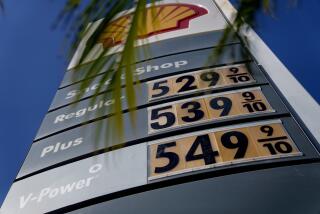Terror, War Worries Push Oil Up 2.5%
- Share via
Crude oil prices had their biggest gain in three weeks Monday, spurred by worries of war with Iraq and recent terrorist bombings in Bali and Yemen.
Although California primarily relies on Alaskan crude for gasoline supplies, continued increases in oil prices worldwide could mean higher prices for motorists here. Within the next two or three weeks, the price at the pump could rise by 17 cents a gallon, an increase of about 11%, said Bob van der Valk, bulk fuels manager for Cosby Oil Co., an independent fuel distributor based in Santa Fe Springs.
“In the total picture, we’re just as connected to the world on crude oil pricing as the rest of the country,” Van der Valk said. The prices Californians are now paying are “not going to last.” The latest figures from the Department of Energy peg the average price for a gallon of self-serve regular gasoline in California at $1.546.
On Monday, meanwhile, shaken Indonesian government officials ordered increased security at oil and natural gas facilities operated by ChevronTexaco Corp. of San Francisco, Exxon Mobil Corp. of Irving, Texas, and other U.S. energy companies, which are among the top investors in Indonesia’s energy sector.
The London-based International Maritime Bureau also has warned oil firms to step up their protection of tankers traveling in the Middle East and along the Malay Peninsula near Indonesia.
Representatives of ChevronTexaco and Exxon Mobil said they were monitoring the situation in Indonesia closely and as of late Monday were not evacuating personnel.
Monday’s spike in oil prices reflected a belief in energy markets that Saturday’s bombing in Indonesia -- a major producer of oil and natural gas and a member of the OPEC cartel -- increases the likelihood of U.S.-led military action against Iraq and a disruption in oil and gas supplies.
Crude oil for November delivery rose 66 cents, or 2.5%, to $30.03 a barrel on the New York Mercantile Exchange, the biggest daily increase since Sept. 23. So far this year, oil prices have risen 51%.
Saturday’s car bomb attack on a nightclub on the Indonesian island of Bali killed at least 188 people, most of them foreigners. That followed an incident last week in which Yemeni officials blamed terrorists for damaging a French oil tanker.
“The market is reacting to the first large attack in a natural gas and oil producing country,” said Kate Warne, a senior energy analyst with Edward Jones, a brokerage in St. Louis. “There is nervousness about supply dis- ruptions anywhere. The real question is whether in the next few weeks or months we actually see that disruption occur.”
The terrorist threats and escalating tensions in the Middle East have created new headaches for U.S. energy firms already struggling with the fallout of the Enron Corp. scandal and supply disruptions caused by recent tropical storms.
“There’s a definite ripple effect here in terms of costs because of heightened security precautions and higher insurance rates,” said analyst Tim Evans at IFR Pegasus in New York. “Ultimately, the oil companies will be trying to the best of their ability to pass those costs on.”
Threats against foreign energy companies are particularly worrisome to Indonesia, which depends on oil and gas exports to support an economy still struggling to recover from the 1997 financial crisis, violent regional conflicts and political instability. Tourism, the country’s third-largest source of foreign currency, suffered a potentially crippling blow with Saturday’s attack in Bali.
On Monday, the Indonesian stock market lost more than 10% of its value and the rupiah, the Indonesian currency, fell to a five-month low. Markets in Japan, the region’s largest, were closed for a national holiday.
Indonesia’s economic problems and the global downturn have curtailed the country’s energy production.
Today, Indonesia exports a little more than 1 million barrels of crude oil a day, said Philip A. Verleger, a senior fellow at the Council on Foreign Relations in New York. He said a disruption to Indonesia’s oil exports is unlikely to have major repercussions on world markets, given alternative supplies.
Indonesia, however, produces about 20% of the world’s natural gas. Its biggest customer is Japan, which buys 30% of its supply from Indonesia.
*
RELATED STORY
Bombing: Indonesia blames deadly blast on Al Qaeda. A1
More to Read
Sign up for Essential California
The most important California stories and recommendations in your inbox every morning.
You may occasionally receive promotional content from the Los Angeles Times.













